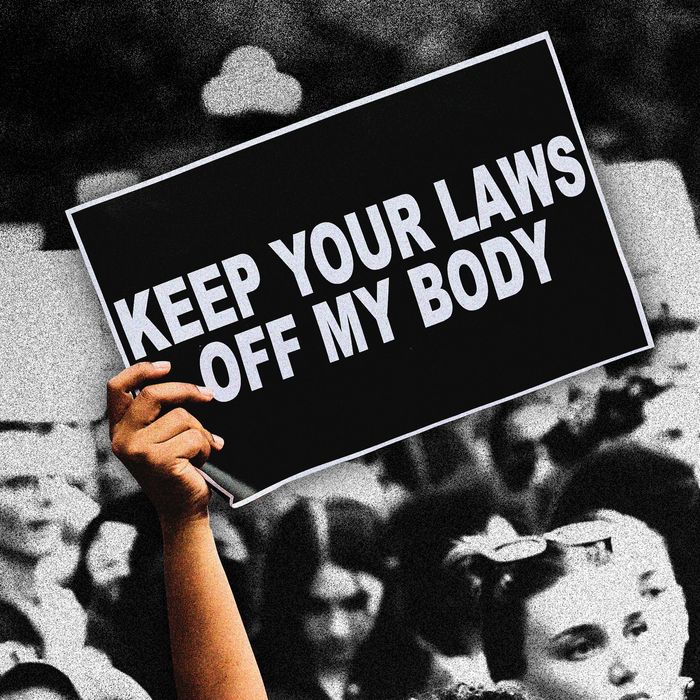
This article was featured in One Great Story, New York’s reading recommendation newsletter. Sign up here to get it nightly.
A self-described whistleblower touting her progressive bona fides, claiming patients are being harmed by rapacious medical providers with no regard for informed consent or side effects. A cadre of former patients stating their regret, claiming the existing research on side effects and outcomes is doctored or misrepresented. Conservative legislators swooping in to purportedly protect these patients from themselves or from greedy doctors, lingering on whatever graphic details they can get their hands on. Centrists, and some liberals, wondering aloud if the strident defense of this health care may be political poison for Democrats, and anyway, surely there’s a middle ground to which only the truly reasonable and unemotional folks can lead us. In the meantime, people who can’t afford to get on a plane to a less hostile state are trapped unless grassroots funds come through, and even helping someone get care can put you in the crosshairs.
All of this describes Abby Johnson, the former executive director of a Planned Parenthood affiliate in Texas who in 2009 described herself as “for gay rights, unions, I voted for Obama” and announced she was so horrified by witnessing an ultrasound-guided abortion that she had to speak out. For years, the strategic testimony of women who said they regretted their abortions has been used to justify abortion restrictions, including by Justice Anthony Kennedy. (People have all kinds of feelings about their abortions, but research shows relief is the most common.) Kennedy was also susceptible to the anti-abortion movement’s use of graphic medical details to justify the bans. Before his even more conservative successors allowed states to ban abortion completely, the right used minors seeking abortions as a testing ground for their policy goals, correctly reasoning that it’s easier to get more people panicked when young people are involved and then expand from there. More recently, Texas led the way in passing laws targeting those who “aid and abet” abortions, incentivizing abortion bounty hunters with cash rewards.
Of course, all of this could also describe Jamie Reed, who self-identifies as “a queer woman, and politically to the left of Bernie Sanders” but teamed up with the right to condemn her former employer, the Washington University Transgender Center at St. Louis Children’s Hospital, in a February affidavit and article. It applies to so-called “detransitioners,” who have been the faces of campaigns to pass legislation banning transgender health care or limiting transgender people’s access to public spaces (though research shows the vast majority of trans adults are happier after their transition). It could easily be about the “parental rights” bills passing in states across the country, which have already given way to bills seeking to ban access to care for adults. And anti-trans lawmakers have added aiding-and-abetting laws to their repertoire.
Local reporting seriously undermined Johnson’s and Reed’s claims but only after the splashy national headlines about the apostates’ outrageous allegations had already made their mark. It’s too soon to say what’s next for Reed, but I know what happened with Johnson: a glide path on the right-wing speaking circuit, capped at the Republican National Convention in 2020, where she endorsed Donald Trump onstage. Despite her professed left-wing views, Reed’s choice of attorneys suggests a certain openness to other associations: They include a local Republican councilman and Vernadette Broyles, who is best known for advising on Florida’s “Don’t Say Gay” bill. Broyles is listed as an ally by the Alliance Defending Freedom, a group whose leaders like to rail against the “homosexual agenda” and helped draft and defend the Mississippi abortion ban that became the vehicle to overturn Roe v. Wade last year. The ADF is also behind the suit asking a sympathetic Trump-appointed judge to ban one of two pills used in medication abortion, which is expected to be decided any day now.
All of this is to say the same small group of people who have made abortion almost impossible in swaths of the country (and aren’t done yet) are now trying to ban trans health care. So far, the same playbook — which comes down to fomenting moral panic around the most vulnerable and co-opting progressive tropes to help fuel it — is working well for them.
There’s reason to believe that Republicans, at least in more purple states, are worried about the kind of electoral backlash that was reflected in the referendum rejecting an abortion ban in Kansas last year and the recent midterm elections. That may actually be fueling the escalating attacks on trans people, says Rose MacKenzie, a campaign strategist at the ACLU who focuses on reproductive rights. “I think anti-abortion politicians are worried about the politics,” says MacKenzie. “They’ve turned to attacking trans youth in order to stay politically viable.”
Conservative activists recognize that even in places where they have successfully evaded democratic accountability, they have some public-relations work to do. Operating in their favor is the general public’s lack of familiarity with trans health care, which creates an opportunity to shape the issue. They’re elevating supposed whistleblowers who are ready to tell gruesome stories, using isolated cases to obscure the bigger picture, and inserting doubt about the judgments of major medical associations. And as they did with restrictions on abortion, contraception, and sex education, they’re focusing on youth first because they understand that it’s much harder to convince the public to restrict the lives of adults, even if the “parental rights” rhetoric is only about the rights of parents who don’t want their child to access gender-affirming care. “You have parents of trans kids standing in front of these lawmakers and saying, ‘I have rights. I should be able to get my child the care that they need,’ and lawmakers looking right back at them and saying, ‘Absolutely not,’” says Arli Christian, a campaign strategist at the ACLU who focuses on trans justice.
Although the issues aren’t identical, both involve who gets to make decisions over one’s own body and life’s course. For years, some anti-abortion activists have tried to argue that they are the true feminists, protecting women’s true maternal nature even when the arrangement has to be forced upon them. A similar co-opting of feminism is at work with anti-trans forces. The website for the trans-exclusionary “Women’s Bill of Rights” offers draft legislation that not only uses superficially feminist language but looks strikingly like the major abortion-rights group NARAL’s website, down to the purple color scheme and Lady Liberty references.
Look a little closer and you’ll see the co-sponsors are the Independent Women’s Forum — a right-wing-funded group that grew out of Women for Judge Thomas, as in Clarence — and the Women’s Liberation Front, a small group of self-identified radical feminists whose representatives have frequently testified in support of anti-trans bills. What they lack in numbers they make up for in rhetorical influence.
A model bill that recently passed both chambers of the Kansas legislature, is making its way through Oklahoma’s, and has been introduced in Congress defines female as “an individual whose biological reproductive system is developed to produce ova.” In its stated desire to exclude trans people from women-identified spaces — a move that would have far-reaching consequences — this “bill of rights” reinforces the rigid notion of a woman as a vessel for reproduction.
Similarly, in leaked emails between conservative activists and legislators reported on by Mother Jones, Reed’s lawyer Broyles writes that transitioning is “chemically and surgically mutilating one’s healthy body, where there is no disease to be treated.” A long-standing anti-abortion argument is that pregnancy is not a disease to be treated but rather a woman’s natural state.
You can find a similar logic in ADF’s filing on behalf of the plaintiffs in the bid to ban a common abortion pill. It uses curious language to describe a long-approved medication: that the FDA should have heeded the supposed impact of a “hormone-blocking regimen on the developing bodies of adolescent girls” in an apparent attempt to link the pill to puberty blockers. Listen to the conservative panic about trans youth for long enough and you’ll hear lots of talk about young girls “sterilizing” themselves, underscoring that part of the terror here is a vacant uterus. (Never mind that they also oppose gender-neutral language that recognizes that trans and nonbinary people also get pregnant.) We’ve reached the point of cross-pollination.
We used to hear a lot more from the political center about how if only radical pro-abortion forces moderated, a rational compromise could be reached. One of the bleak consequences of the Dobbs decision is that almost no one seriously suggests that anymore. Roe is dead, and it’s harder to accuse advocates of hysterically exaggerating the threat when emboldened state legislators are openly talking about executing abortion patients. The accusation of going too far too fast has now been aimed at supporters of trans rights.
Meanwhile, the end of federal protections for abortion rights has left trans people more vulnerable. “Do we have a constitutional right to privacy anymore? I don’t know,” says the Center for Constitutional Rights senior staff attorney Chinyere Ezie. “I’m a whole constitutional lawyer, and I can’t tell you with certainty, now that Roe v. Wade has been stricken, if each and every substantive due-process case that was decided on the theory that there’s a constitutionally protected right to privacy, to decisional autonomy, to medical decision-making — I don’t know if that exists anymore such that we’ll be able to defeat these laws.”
These interconnections don’t have to happen only on the right. When I interviewed MacKenzie, it was in conjunction with her colleague Christian. They’re trying to coordinate with each other more. So are medical providers, MacKenzie pointed out. “Stigmatized health care — abortion and gender-affirming care — are sometimes siloed off from the rest of the medical community, and so a lot of the community clinics kind of group together,” she said. These providers are used to being targeted by lawmakers and getting death threats. Sometimes, these providers are even one and the same, she added. “Planned Parenthood offers gender-affirming care.”
That fact is not lost on the Missouri state government. When abortion was legal in Missouri, state health officials subjected Planned Parenthood to fishing expeditions, including an infamous spreadsheet that officials admitted tracked patients’ last menstrual periods. Now the attorney general has opened up a new probe related to trans health care.
Recognizing the parallels here doesn’t mean shutting down reporting about, say, whether some health-care providers are behaving unethically; in limited cases, stigma and a fear of the right’s using individual bad actors to bring down access for all have led to unsafe abortion providers continuing to operate for far too long. But these attacks depend on a divided potential opposition, on the ability to obscure the big picture, and on forgetting what has come before. Put another way: Don’t be a mark. This is a coordinated, well-designed plan. The cost of falling for it isn’t just being tricked or not seeing the world clearly. It’s the sacrificing of the most vulnerable people to activists who have no intention of stopping there.






























